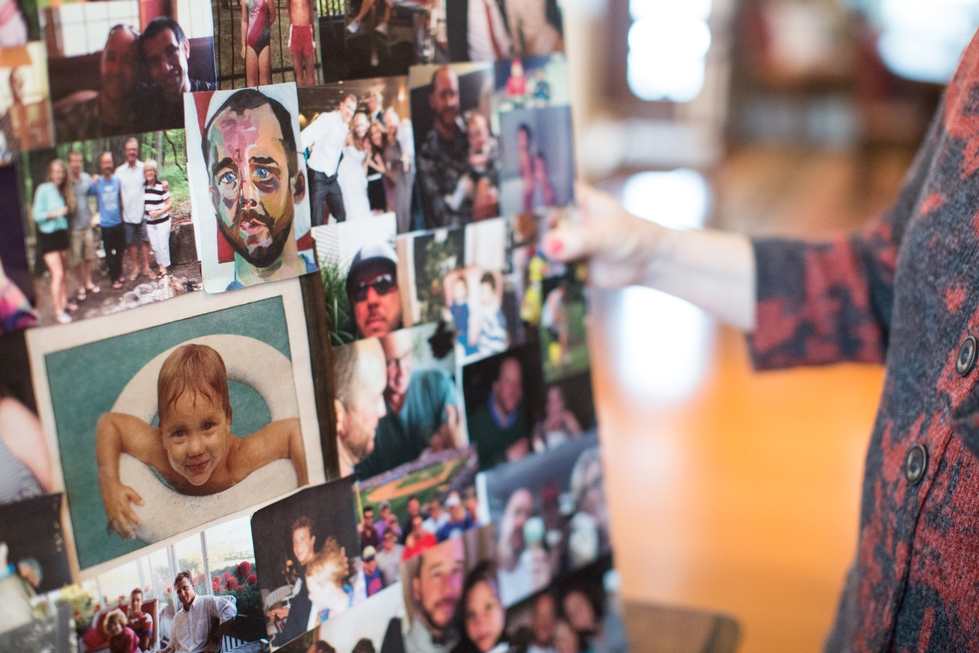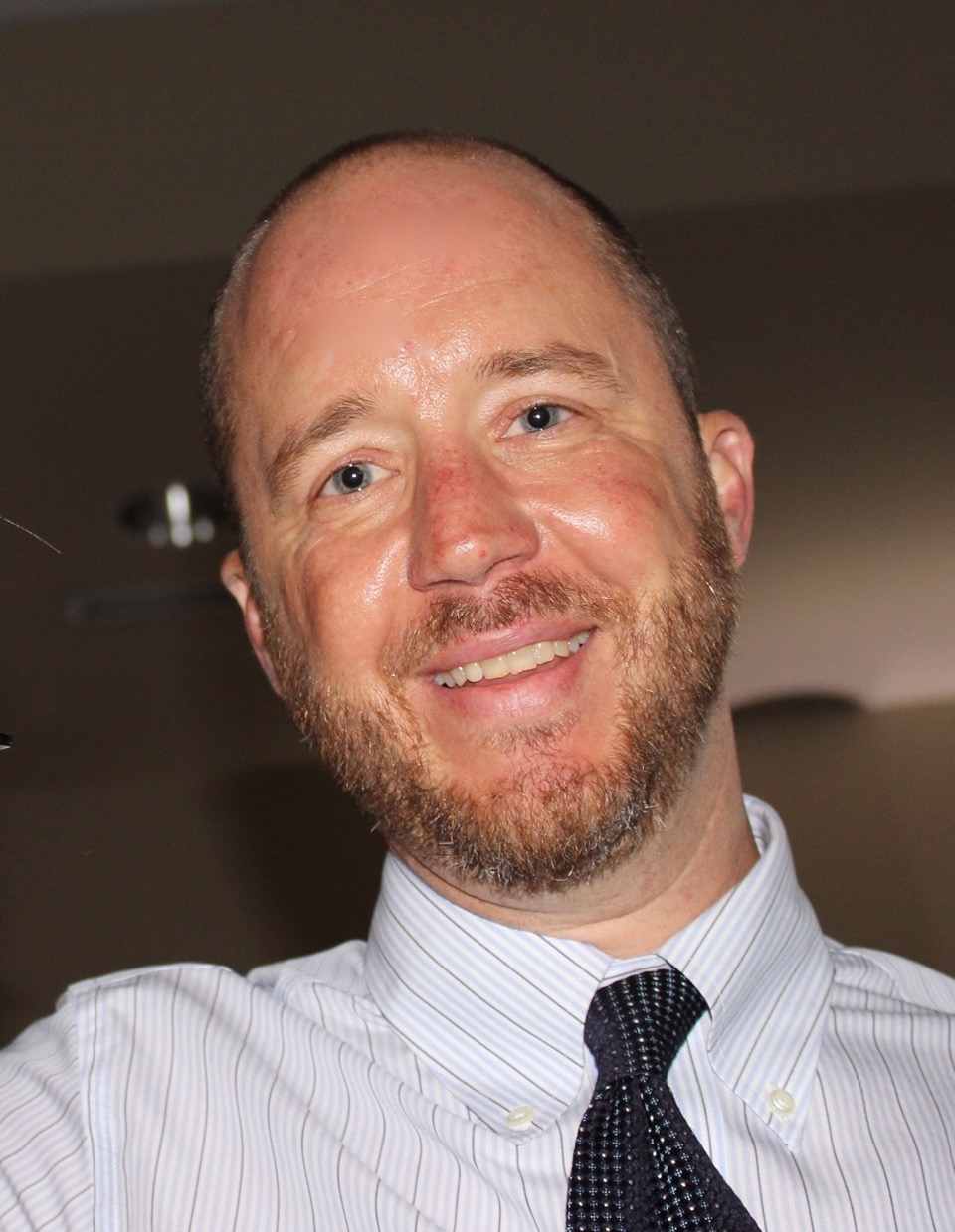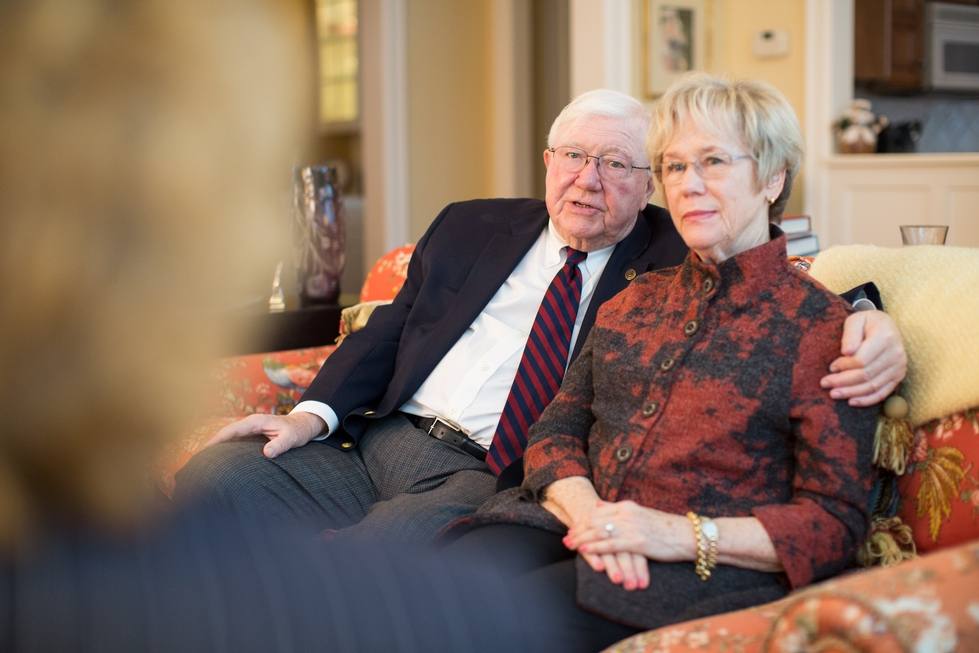Fund honors son's memory
Benefits mental health program
by Michele Coffill
photos courtesy of Lubbers family, unless indicated
The juxtaposition of two photos within a collage of 40 was striking.
In one photo, Andy Lubbers is a smiling toddler with chubby cheeks, happily floating in water with his arms wrapped around a white, inflatable pool ring.
To its right is an illustrated portrait of Andy as an adult. The abstract of Andy was created by one of his friends and it captures the bleakness that often accompanies mental illness. In the illustration, Andy’s eyes are wide with deep shadows underneath, his brow furrowed and his face hollow.

Nancy Lubbers holds the photo collage that was displayed at Andy’s memorial service. (Amanda Pitts)
Being open about Andy’s struggle with mental illness was important to his parents, President Emeritus Arend “Don” Lubbers and Nancy Lubbers. Andy chose to end his life in September at age 43 after battling depression and mental illness for decades. Don Lubbers was Grand Valley’s president from 1969-2001.
The Lubberses have been open about Andy’s cause of death, listing it in his obituary and, in February, making a public announcement that established the “Andy Lubbers be nice. Memorial Fund.”
The “be nice.” program is operated by the Mental Health Foundation of West Michigan. The program provides K-12 students, staff and parents with tools to recognize a mental illness and steps to take a proactive approach. Money donated to the Andy Lubbers fund will support the program in Kent County schools.
(See sidebar at bottom of page for more information about be nice. and how to donate to the fund.)
Don and Nancy said they found support and resources in the community to help their family, and wanted to help others through the fund.
“We need to reduce the stigma of mental illness,” Nancy said. “If we can devote energy to helping other people who have experienced what we have, and if we can raise awareness, we would be so grateful.”
Andy seemed to have lived two lives. For the first half of his life, he was very happy and healthy. He attended East Grand Rapids High School. In her eulogy, his sister, Caroline, said he thrived there.
“He was an athlete who played football, basketball and baseball. Often he would procrastinate, do his homework last minute, and still easily achieve good grades and accolades. At the high school talent show, he slipped on dark sunglasses, took the microphone, and became a rock star, belting out ‘Mustang Sally’ with gusto. Andy’s senior year he was elected class president, beating very worthy if not even better qualified candidates. In his youth, things came easily to Andy.”
After high school, Andy enrolled in college in Richmond, Virginia. Nancy said it was during his early months as a first-year student when she noticed something was wrong. “He was failing. It was apparent that something wasn’t right,” she said. “We didn’t know what it was, but knew it was something.”
After years of ups and downs and a number of doctor’s visits, Andy was diagnosed with bipolar disorder. As a way to self-medicate, he began abusing substances, which led to addiction.
Don said they learned the timing of Andy’s disease was not uncommon. “A psychologist told us that the onset of mental illness often occurs in late adolescence and in the 20s,” he said. “So even after having a normal childhood, one can still fall prey to mental illness.”
Andy didn’t go back to Virginia after that first semester. He found jobs in Grand Rapids as a restaurant server, house painter and landscape worker. He would sometimes take courses at Grand Rapids Community College.
“He always did well when he was able to work and take classes,” Don said.
Andy maintained loving relationships with family members, friends and significant others. Don called that a good memory.
“The best part of this bad situation was that he was not like so many people you hear about who are estranged from their families,” Don said. “But despite the friendships, relationships and family love, he recognized that was not enough to override the horrible plight of depression.”
.

Nancy said she and Don chose to be public about mental illness and suicide, in part, to dispel myths and hopefully start conversations.
“It’s a misconception that if you have love, a good family and a nice home, you can’t be depressed,” she said. “That has nothing to do with it. The disease has chemically altered your brain.
“We wanted to be honest about it in the obituary and now we’re putting our energies toward being public.”
Through a community connection, the Lubberses were introduced to Christy Buck, executive director of the Mental Health Foundation of West Michigan, who then informed them about the be nice. program.
“If it saves a life because someone will find help, it was worth our efforts,” Don said.
They both knew it was the right fit after learning Grand Valley students have started a be nice. chapter, joining other collegiate chapters at GRCC and Ferris State University.
“Mental illness is a huge problem on college campuses,” Nancy said. “be nice. helps educate people on what signs to look for, like changes in behavior, and it gives tools on how to approach someone and where help can be found, and that it’s OK to talk about this.”
Nancy said it was painful to watch Andy try his best to survive during his darkest periods, while understanding that medications and hospitalizations were not offering long-term relief.

Don and Nancy Lubbers discuss their son’s death and the memorial fund they established in his name. (Amanda Pitts)
They do not cast blame or feel angry at Andy for taking his life; Nancy said his endurance was broken.
“It was impossible for him to rid himself of that deep, dark pain,” she said.
They continue to process their grief. Don said, for him, it’s like a weather front. “It blows in and you’re feeling sad, and then it passes for a while,” he said.
At Andy’s memorial service, Caroline spoke about finding a journal of Andy’s with a note that said, “I wish I could detach myself from this brain of mine.” She closed her eulogy by offering others in attendance the peace that Andy received.
“In the end, he did find a way to detach himself from that complicated brain of his. As we use words like grief, sorrow and loss, let’s balance them with relief, freedom and peace. And, let us deny any feelings of anger or guilt. When I lie awake at night, swallowed by sorrow, a clipped movie reel of memories plays in my head. Luckily, the memories that come to me most easily have been all the happiest times that I had with Andy. I hope it will be the same for you.”
be nice.
Notice, Invite, Challenge, Empower. These are the core tenets of the “be nice.” initiative, established by the Mental Health Foundation of West Michigan.
Christy Buck, executive director of the foundation, said be nice. started in 2010 following the suicide of Rutgers University student Tyler Clementi, whose death brought national attention to cyberbullying.
“There was a lot of attention at that time on bullying behavior,” Buck said. “We realized what needed attention was bringing awareness to being able to recognize signs of depression that can be brought on by how someone is being treated.”
be nice. is a mental health program that educates students, staff and parents by providing them tools to recognize a mental health disorder. It’s an action plan to help others notice, invite, challenge and empower their peers.
“The be nice. action plan is a four-step approach to helping someone who may be struggling with a mental health disorder,” she said. “This is an opportunity to notice the changes in someone’s behavior, invite yourself to reach out, challenge them to get help, challenge the stigma, and empower them with your support.”
More than 120 schools have started be nice. chapters. Schools purchase curriculum kits from the Mental Health Foundation to start be nice. as a new initiative or to complement an existing mental health bully/suicide prevention program or club.
The Andy Lubbers be nice. Memorial Fund will provide matching funds for schools in Kent County to purchase be nice. curriculum kits. There are similar funds available for schools in Oceana, Ottawa and Muskegon counties; all were established by people with similar stories to Don and Nancy Lubbers.
“It is a testament of the Lubberses’ love for Andy to do this, and we are extremely honored for their support,” Buck said. Donations to the Andy Lubbers fund can be made online at givegr.org/ benice; checks can be made payable to the Grand Rapids Community Foundation c/o the “Andy Lubbers be nice. Memorial Fund.”
Counseling Center visits increase
Amber Roberts is the director of the University Counseling Center at Grand Valley. She and the other 16 clinical staff members are busy leading individual counseling sessions and 25 different group therapy sessions, plus handling emergency calls and visits.
Roberts said over the past two years, there has been a 30 percent increase in the number of student visits to the Counseling Center. She attributed some of that increase to a rise in help-seeking behaviors. And some students find the transition to college incredibly difficult.
“Families need to talk about mental health,” Roberts said. “Make it an OK conversation. Say, ‘College is going to be hard, if you need help, what will you do?’”
She said it’s important for students to find a sense of community when they arrive on campus.
“It’s all about finding a connection with other students, faculty or staff. It’s your own community that gives you a sense of home,” Roberts said.
Common signs of depression include not finding anything enjoyable, sleeping too much or too little, and being easily frustrated. Experiencing one or two of those symptoms for short periods of time is normal, she said; when multiple symptoms linger for long periods of time, it’s time to seek help.
“If those signs are recognized early, we can be pretty successful in treating someone,” Roberts said.
